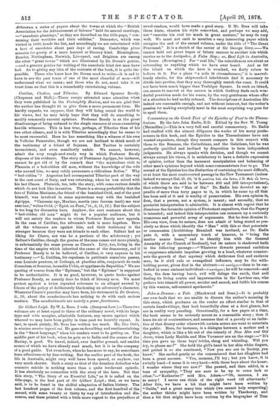Commentary on the Greek Text of the Epistles of Paul
to the Thessa- lonians. By the late John Eadie, D.D. Edited by the Rev. W. Young (Macmillan.)—This is a very full and careful commentary. Dr. Eadie had studied with the utmost diligence the works of his many prede- cessors in this book, and the Epistles to the Thessalonians have not wanted expositors, though they cannot compare in this respect with those to the Romans, the Corinthians, and the Galatians, but he was perfectly qualified and inclined by disposition to form independent judgments. He always speaks with decision, and though we cannot always accept his views, it is satisfactory to have a definite expression of opinion, rather than the incessant manipulation and balancing of other men's opinions beyond which some commentators fear to go. The second of the Epistles has the distinction of containing the most difficult, or at least the most controverted passage in the New Testament (unless indeed we except Gal. iii. 20, 'o pesig-ss has slot fern, 4 Ii Oaf ITS tern,. of which there are said to be between 400 and 500 interpretations), that referring to the "Man of Sin." Dr. Eadie has devoted an ap- pendix of more than forty pages to it, in which he sums up all that has been said of it and is worthy of preservation. His own opinion is, first, that a person, not a system, is meant ; and secondly, that no praterist interpretation is admissible. It is almost with regret that he dismisses the favourite opinion of Protestant expositors, that the Papacy is intended ; and indeed this interpretation can summon up a curiously numerous and powerful array of arguments. But he does dismiss it His own view, from its nature, does not admit of being stated as pre- cisely as those which identify the "Man" with this or that potentate or communion (Archbishop Bramhall was inclined, as Dr. Eadie pats it, with a momentary touch of humour, to "bring the matter nearer home," and to identify him with the General Assembly of the Church of Scotland), but its nature is shadowed forth in the following passage :—" Whatever thwarts personal ambition or suppresses atheistic impulses growing to a head, whatever counter- acts the growth of that mystery which dethrones God and enslaves man, be it civil rule or evangelical influence, may be the with- holding power, given first in the abstract— ra xeprixsv—then to be em- bodied in some eminent individual-1, za,rixedy; he will be removed—and then, the dam having burst, evil will deluge the earth, that evil finding its living centre and impersonation in the Lawless one, who gathers into himself all power, secular and sacred, and fulfils his coarse by this wanton, self-created apotheosis."


































 Previous page
Previous page